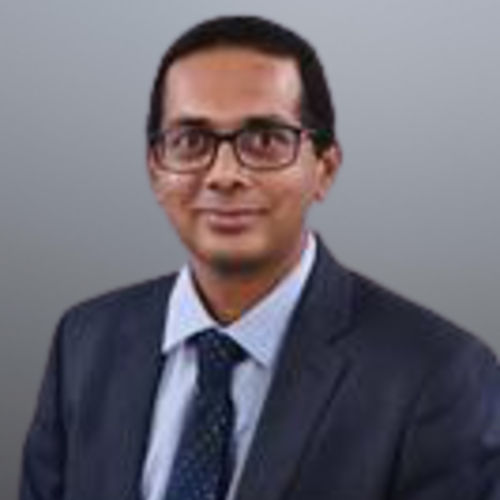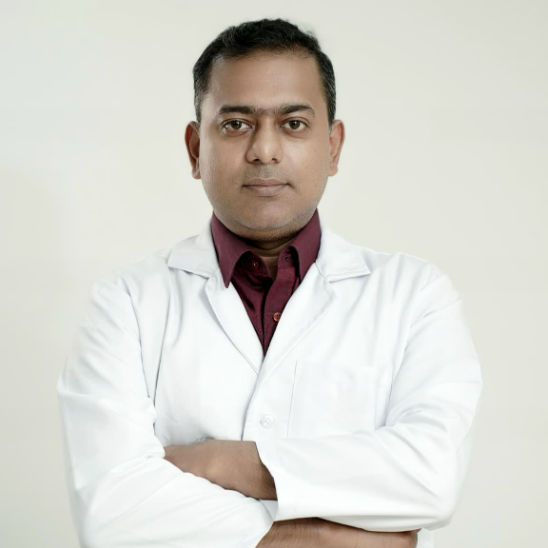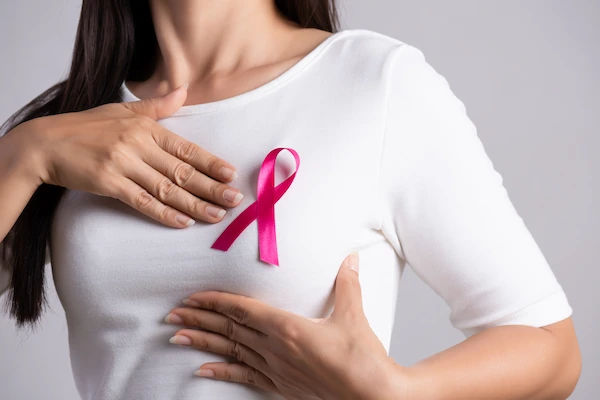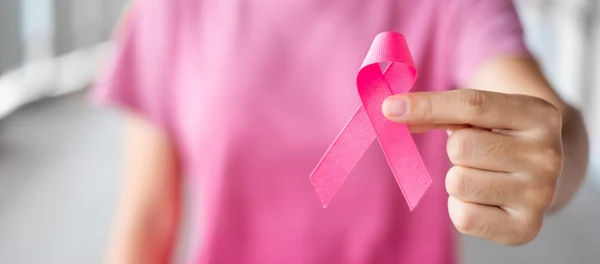Early Signs of Breast Cancer: A Guide to Detection & Action
Learn the early signs of breast cancer beyond a lump, including skin and nipple changes, and understand how self-exams and early detection can save lives.

Written by Dr. Shaik Abdul Kalam
Reviewed by Dr. Vasanthasree Nair MBBS
Last updated on 13th Jan, 2026

Introduction
Breast cancer is the most common cancer among women worldwide, but here's the empowering truth: when detected early, the 5-year survival rate is over 90%. The key to unlocking this positive outcome lies in knowing your body and recognising the subtle whispers it sends before they become shouts. This guide moves beyond the well-known "lump" to unveil the early signs of breast cancer that every person should be aware of. Knowledge is your first line of defence. We will walk you through the five primary symptoms, show you what to look for during a self-exam, and outline the clear, calm steps to take if you notice a change. Your health is in your hands—let’s learn how to protect it together.
Why Catching Breast Cancer Early Is Crucial
Early detection isn't just a buzzword; it's a lifesaver. The primary goal of identifying breast cancer in its initial stages is to begin treatment before the cancer has a chance to grow large or spread (metastasise) to lymph nodes or other organs. Treatments for early-stage cancers are often less aggressive, more effective, and have significantly better outcomes.
The Power of Early Detection on Survival Rates
The statistics are compelling. According to the American Cancer Society, the 5-year relative survival rate for women with localised breast cancer (cancer that hasn't spread outside the breast) is 99%. This number underscores the profound importance of vigilance. Early-stage cancers can often be treated with breast-conserving surgery (lumpectomy) and potentially avoid the need for a full mastectomy. In short, the earlier it's found, the more options you have and the higher your chances of a full recovery.
The 5 Most Common Early Signs of Breast Cancer
While some early breast cancers cause no symptoms at all, being familiar with your body helps you identify any changes that may be a cause for concern.
1. A New Lump or Mass
The most widely recognised early sign of breast cancer is a new lump or mass. However, not all lumps are created equal.
• A cancerous lump is often painless, hard, and has irregular edges. However, some can be tender, soft, or rounded.
How to Identify a Suspicious Lump
The key is to look for what's new or changing. Perform monthly self-exams to learn the normal landscape of your breasts—this includes familiarising yourself with typical lumpiness (which can be related to your menstrual cycle). Any new, persistent lump that doesn't go away after your period should be evaluated by a doctor.
2. Changes in Breast Size, Shape, or Contour
Look for unexplained changes in the size or shape of one breast. One breast may become noticeably larger or lower than the other. You might also see a visible distortion or swelling of the breast, even if no distinct lump is felt.
3. Skin Changes on the Breast or Nipple
The skin on your breast can provide critical clues.
• Dimpling: Skin that begins to look like the peel of an orange (peau d'orange) is a classic sign.
• Redness, Scaliness, or Thickening: Patches of skin that become red, flaky, or thickened, especially around the nipple or areola, should not be ignored.
Understanding Peau d'Orange and Redness
These changes often occur when cancer cells block lymph vessels in the skin, causing inflammation and a characteristic pitted appearance. This can be a symptom of inflammatory breast cancer, a rare but aggressive form.Consult an Oncologist for Personalised Advice
4. Nipple Changes and Unusual Discharge
Pay attention to your nipples. Signs include:
• A nipple that suddenly turns inward (inversion).
• Pain in the nipple area.
• Nipple discharge that is bloody, clear, or occurs without squeezing (spontaneous discharge) from one breast only.
5. Persistent Pain in a Specific Area
While general breast pain is more commonly linked to hormonal changes or benign cysts, persistent pain in one spot that doesn't fluctuate with your menstrual cycle warrants medical attention.
Beyond the Lump: Lesser-Known Symptoms to Watch For
Sometimes, the symptoms of breast cancer besides a lump can be the only indicators. These can include:
• Swelling in the armpit or around the collarbone (indicating swollen lymph nodes).
• Persistent itching or a rash on the breast that doesn't resolve with cream.
• A sudden, unexplained change in the texture or colour of the breast skin.
• A marble-like area under the skin that feels distinctly different from the rest of the breast tissue.
How to Perform a Breast Self-Exam at Home
A monthly self-exam is a powerful tool for early detection. The best time is 3-5 days after your period ends, when breasts are least likely to be swollen and tender.
Step-by-Step Guide for a Monthly Check
1. In the Shower: Using the pads of your three middle fingers, move firmly over every part of each breast and armpit area. Check for any lump, thickening, or hardened knot.
2. In Front of a Mirror: Visually inspect your breasts with your arms at your sides, then raised overhead. Look for any changes in contour, swelling, dimpling, or changes in the nipples.
3. Lying Down: Place a pillow under your right shoulder and your right arm behind your head. Using your left hand, move the pads of your fingers in small circular motions around your right breast and armpit. Repeat on the left side.
What to Do If You Notice a Potential Sign
Finding a change can be frightening, but the most important thing is to take calm, deliberate action.
Don't Panic: Next Steps and When to See a Doctor
First, remember that most breast changes are not cancer. However, you should never ignore them. If you notice any persistent change in your breasts, such as a new lump or skin dimpling that lasts beyond two weeks, consult a doctor online with Apollo24|7 for further evaluation. They can ask detailed questions and recommend the next steps, which may include an in-person clinical exam or imaging tests like a mammogram or ultrasound. Early evaluation provides peace of mind and, if necessary, a critical head start on treatment.
Conclusion
Understanding the early signs of breast cancer empowers you to take an active role in your health journey. From the classic warning of a new lump to the more subtle hints of skin dimpling or nipple discharge, this knowledge allows for proactive detection. Remember, while these signs can be alarming, they are often caused by benign conditions. The critical action is not to ignore them. Schedule regular clinical exams and mammograms as recommended for your age and risk level, and always report any persistent changes to your healthcare provider immediately. If you have any concerns or notice a potential symptom, don't hesitate to consult a doctor online with Apollo24|7 for prompt, professional guidance and to book any necessary diagnostic tests. Your vigilance today can make all the difference for your tomorrow.Consult an Oncologist for Personalised Advice
Consult an Oncologist for Personalised Advice

Dr Gowshikk Rajkumar
Oncologist
10 Years • MBBS, DMRT, DNB in Radiation oncology
Bengaluru
Apollo Clinic, JP nagar, Bengaluru

Dr. Ruquaya Ahmad Mir
Surgical Oncologist
20 Years • MBBS, DNB
Delhi
Apollo Hospitals Indraprastha, Delhi
(25+ Patients)

Dr. Raja T
Oncologist
20 Years • MBBS; MD; DM
Chennai
Apollo Hospitals Greams Road, Chennai
(200+ Patients)

Dr. Vishwanath S
Oncologist
8 Years • MBBS, MD, DM, Fellowship at MD Anderson Cancer Center
Bengaluru
Apollo Spectra Hospitals, Koramangala, Bengaluru

Dr. Sanchayan Mandal
Medical Oncologist
17 Years • MBBS, DrNB( MEDICAL ONCOLOGY), DNB (RADIOTHERAPY),ECMO. PDCR. ASCO
Kolkata
MCR SUPER SPECIALITY POLY CLINIC & PATHOLOGY, Kolkata
Consult an Oncologist for Personalised Advice

Dr Gowshikk Rajkumar
Oncologist
10 Years • MBBS, DMRT, DNB in Radiation oncology
Bengaluru
Apollo Clinic, JP nagar, Bengaluru

Dr. Ruquaya Ahmad Mir
Surgical Oncologist
20 Years • MBBS, DNB
Delhi
Apollo Hospitals Indraprastha, Delhi
(25+ Patients)

Dr. Raja T
Oncologist
20 Years • MBBS; MD; DM
Chennai
Apollo Hospitals Greams Road, Chennai
(200+ Patients)

Dr. Vishwanath S
Oncologist
8 Years • MBBS, MD, DM, Fellowship at MD Anderson Cancer Center
Bengaluru
Apollo Spectra Hospitals, Koramangala, Bengaluru

Dr. Sanchayan Mandal
Medical Oncologist
17 Years • MBBS, DrNB( MEDICAL ONCOLOGY), DNB (RADIOTHERAPY),ECMO. PDCR. ASCO
Kolkata
MCR SUPER SPECIALITY POLY CLINIC & PATHOLOGY, Kolkata
Consult an Oncologist for Personalised Advice

Dr Gowshikk Rajkumar
Oncologist
10 Years • MBBS, DMRT, DNB in Radiation oncology
Bengaluru
Apollo Clinic, JP nagar, Bengaluru

Dr. Ruquaya Ahmad Mir
Surgical Oncologist
20 Years • MBBS, DNB
Delhi
Apollo Hospitals Indraprastha, Delhi
(25+ Patients)

Dr. Raja T
Oncologist
20 Years • MBBS; MD; DM
Chennai
Apollo Hospitals Greams Road, Chennai
(200+ Patients)

Dr. Vishwanath S
Oncologist
8 Years • MBBS, MD, DM, Fellowship at MD Anderson Cancer Center
Bengaluru
Apollo Spectra Hospitals, Koramangala, Bengaluru

Dr. Sanchayan Mandal
Medical Oncologist
17 Years • MBBS, DrNB( MEDICAL ONCOLOGY), DNB (RADIOTHERAPY),ECMO. PDCR. ASCO
Kolkata
MCR SUPER SPECIALITY POLY CLINIC & PATHOLOGY, Kolkata
More articles from Breast Cancer
Frequently Asked Questions
1. Can you have breast cancer without a lump?
Yes, absolutely. While a lump is common, other symptoms like skin changes (peau d'orange, redness), nipple retraction, or persistent pain can be the primary signs, especially in more aggressive types like inflammatory breast cancer.
2. What does a breast cancer lump actually feel like?
It often feels like a hard, immovable mass with irregular edges. However, it can sometimes be soft, tender, or rounded. The most important factor is that it is a new lump or a change from what your breast normally feels like.
3. Is breast pain usually a sign of cancer?
Not usually. Breast pain (mastalgia) is more commonly related to hormonal fluctuations, cysts, or muscle strain. However, if the pain is persistent, located in one specific spot, and not related to your menstrual cycle, it should be evaluated by a doctor.
4. How often should I get a mammogram?
Guidelines vary. Generally, women at average risk are advised to start annual or biennial mammograms at age 40-50. It's best to discuss your personal and family history with your doctor to create an individualised screening plan.
5. Can men get breast cancer?
Yes, men can get breast cancer, although it is rare. Men should also report any lumps, skin changes, or nipple discharge to a doctor immediately.
_3.webp)


